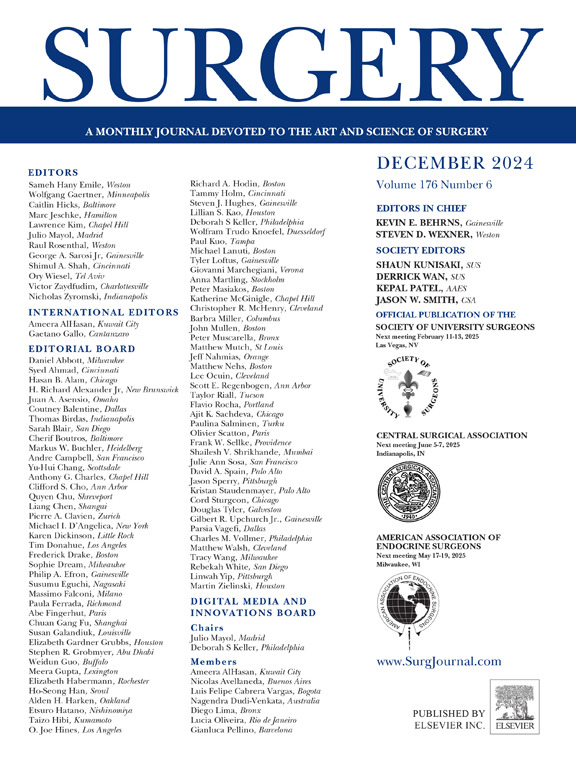新辅助免疫化疗和新辅助放化疗治疗局部晚期食管鳞状细胞癌的疗效
IF 3.2
2区 医学
Q1 SURGERY
引用次数: 0
摘要
食管鳞状癌是一种世界性的常见癌症,尤其在中国。很少有研究比较新辅助免疫化疗和新辅助放化疗对食管鳞癌患者长期预后的影响。本研究分析局部晚期食管鳞癌行食管切除术患者在新辅助免疫化疗或新辅助放化疗后的3年总生存率。方法选取2010 - 2020年在浙江省肿瘤医院接受新辅助放化疗的309例食管鳞癌患者和2019 - 2020年接受新辅助免疫化疗的88例患者作为研究对象。使用1:1比例匹配的倾向评分和0.02的卡尺来平衡基线特征。结果本研究纳入397例局部进展期胸段性食管鳞状癌患者,其中88例接受新辅助免疫化疗,309例接受新辅助放化疗。倾向评分匹配后,两组患者的病理完全缓解差异无统计学意义(21.3% vs 33.3%, χ2 = 2.148, P = 0.143),新辅助免疫化疗组的3年总生存率更高(73.8% vs 54.8%, P = 0.003),特别是对于原发性Ⅲ诊断(T3N1M0, T1-3N2M0)或最初怀疑淋巴结转移的患者。病理完全缓解在接受新辅助放化疗的患者中成为长期预后的可靠预测指标,但在接受新辅助免疫化疗的患者中却不是。结论新辅助免疫化疗与原发性Ⅲ诊断或初步怀疑淋巴结转移患者的长期预后改善相关。新辅助免疫化疗加手术是治疗局部晚期胸节段性食管鳞状癌的有效治疗策略。本文章由计算机程序翻译,如有差异,请以英文原文为准。

Outcomes of neoadjuvant immunochemotherapy and neoadjuvant chemoradiotherapy in patients with locally advanced esophageal squamous cell carcinoma
Background
Esophageal squamous carcinoma is a prevalent cancer worldwide, particularly in China. Few studies have compared the treatment effects of neoadjuvant immunochemotherapy and neoadjuvant chemoradiotherapy on the long-term prognosis of patients with esophageal squamous carcinoma. This study analyzed the 3-year overall survival rate of patients with locally advanced esophageal squamous carcinoma treated with esophagectomy after neoadjuvant immunochemotherapy or neoadjuvant chemoradiotherapy.
Methods
A total of 309 patients with esophageal squamous carcinoma who underwent neoadjuvant chemoradiotherapy between 2010 and 2020 and 88 who underwent neoadjuvant immunochemotherapy between 2019 and 2020 at Zhejiang Cancer Hospital were included in this study. Propensity score matching with a 1:1 ratio and a caliper of 0.02 was used to balance the baseline characteristics.
Results
The study included 397 patients with locally advanced thoracic segmental esophageal squamous carcinoma, including 88 who received neoadjuvant immunochemotherapy and 309 who received neoadjuvant chemoradiotherapy. After propensity score matching, there were no significant differences in pathologic complete response between the 2 groups (21.3% vs 33.3%, χ2 = 2.148, P = .143), and the neoadjuvant immunochemotherapy group demonstrated a greater 3-year overall survival rate (73.8% vs 54.8%, P = .003), particularly for patients with a primary stage Ⅲ diagnosis (T3N1M0, T1–3N2M0) or an initial suspicion of lymph node metastases. Pathologic complete response emerged as a reliable predictor of long-term outcomes in patients receiving neoadjuvant chemoradiotherapy, but not in those receiving neoadjuvant immunochemotherapy.
Conclusion
Neoadjuvant immunochemotherapy was associated with improved long-term prognosis in patients with a primary stage Ⅲ diagnosis or an initial suspicion of lymph node metastases. Neoadjuvant immunochemotherapy plus surgery emerged as an effective therapeutic strategy for treating locally advanced thoracic segmental esophageal squamous carcinoma.
求助全文
通过发布文献求助,成功后即可免费获取论文全文。
去求助
来源期刊

Surgery
医学-外科
CiteScore
5.40
自引率
5.30%
发文量
687
审稿时长
64 days
期刊介绍:
For 66 years, Surgery has published practical, authoritative information about procedures, clinical advances, and major trends shaping general surgery. Each issue features original scientific contributions and clinical reports. Peer-reviewed articles cover topics in oncology, trauma, gastrointestinal, vascular, and transplantation surgery. The journal also publishes papers from the meetings of its sponsoring societies, the Society of University Surgeons, the Central Surgical Association, and the American Association of Endocrine Surgeons.
 求助内容:
求助内容: 应助结果提醒方式:
应助结果提醒方式:


